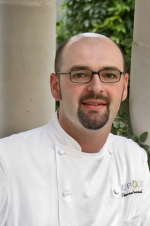Interview with Chef Vincent Pouessel of Aureole - Las Vegas, NV
Amy Tarr: Why did you start cooking? What or who inspired you to become a chef?
Vincent Pouessel: My uncle was a high-end butcher in Paris. He gave me all the love of the work – loving where you realize a plate, it pleases you, it makes you happy to execute something well. One of my uncle’s customers in a restaurant needed help, so I started working for him. But my very first summer experience was at 15. My aunt ran the charcouterie side of the butcher shop – terrines, sausage, etc.
AT: Where did you train? Would you recommend culinary school to aspiring chefs today?
VP: I went to the Lycée Hotelier Notre Dame in Brittany. It was a very strict Catholic culinary school. It was extremely disciplined, which is good to lead you into a profession of discipline and respect. The kitchen is one of the best places to understand and have a true idea of respect – for people and your product.
AT: How did you first meet Charlie Palmer?
VP: After my experience in culinary school, I worked in Paris at the Eiffel Tower – it’s one of the busiest restaurants in Paris. After 5 years I needed something different. I told the chef I wanted to move on and he told me all about Philippe Rispoli working at Daniel in New York. Philippe was about to take a position at the Mansion at MGM Grand and needed a second. I had faith in Philippe and the chef who introduced us. Charlie approached me through Philippe, who agreed to take a position at Aureole on the condition that I come too.
AT: What is your philosophy on food and dining?
VP: I put myself in the diner’s position. I want them to be satisfied. I give attention to each detail. As much as I can, I make the product my number one focus. Especially a product that’s affordable, that women know about and can buy in the grocery store. You can create a memorable menu of truffles, caviar, foie gras, but your palate doesn’t remember. Beets and other ingredients you have at home, you remember.
AT: What is your most indispensable kitchen tool? Why?
VP: My staff. My wife tells me every day that if I care a little more about her than my staff, well….My staff is extremely important and I have to take care of them.
AT: Is there a culinary technique that you have either created or use in an unusual way?
VP: I’m not sure that I’ve ever created anything. But like Paul Bocuse used to say on TV, I’m learning every day. There’s not a day that I don’t see something new. Paul really showed that humility goes a long way in our profession. The star is the product, not the chef.
AT: What is your favorite question to ask during an interview for a potential new line cook?
VP: The very first thing I ask is, “Do you like to eat? Do you like good food? Would you rather enjoy a slice of country pâté with cornichons or an In and Out burger?” You have to appreciate and take pleasure in food.
AT: What tips would you offer young chefs just getting started?
VP: If you want to be a cook and make a career out of it, don’t ever be afraid of the work. In 2005 the bottom line is that it’s a hands-on job. There’s no machine, no robot that is going to make food smell or taste the way a human can, or make sure the brioche dough has enough puff. You need human senses and you have to work hard, but it’s worth it.If you take any normal restaurant, the person who serves the food makes twice as much as the person who makes the food. In any country. But if you want to succeed, with talent, hard work, and opportunity, you’ll be able to make it well.
AT: Where do you see yourself in 5 years? In 10 years?
VP: Not in Charlie’s shoes. It’s become an entirely different profession. Charlie misses the kitchen. I’m still pretty motivated and excited about being in the kitchen. I’m going to be around a while. I hope to have my own little spot. Nothing fancy. I’m more of a rustic person.






